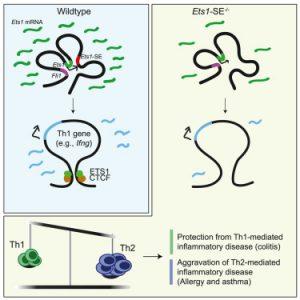In a new study, researchers unravelled the mysteries surrounding why certain individuals are more susceptible to allergies than others. They have identified a key protein called ETS1 that plays a crucial role in our body’s response to allergies (Figure 1). The study found that even minor genetic variations affecting the ETS1 protein can significantly increase the likelihood of experiencing allergic reactions that trigger inflammation.
While previous research has established a strong link between genetics and allergies, the specific mechanisms by which our DNA influences our susceptibility to these chronic conditions have remained elusive. However, gaining a deeper understanding of this intricate relationship could pave the way for enhanced research endeavours and the development of potential new treatments.
Using cutting-edge genomics and imaging techniques, the researchers discovered that the ETS1 protein exerts control over a vital type of immune cell known as CD4+ T helper cells. These cells play a pivotal role in allergic reactions, orchestrating the immune response by activating and coordinating other immune cells. The interaction between DNA and the genomic segment encompassing the ETS1 gene regulates the production of the ETS1 protein, thereby influencing the delicate balance of immune cells.
This groundbreaking work not only sheds light on the underlying genetic factors contributing to allergies but also highlights how minute genetic variations can disrupt the equilibrium among our immune cells, resulting in observable characteristics in patients.
Journal article: Chandra, A, et al., 2023. Quantitative control of Ets1 dosage by a multi-enhancer hub promotes Th1 cell differentiation and protects from allergic inflammation. Immunity.
Summary by Stefan Botha

